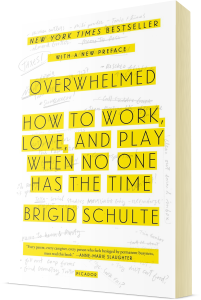Overwhelmed, Part IV: Leisure time is medicine for the soul
By Lea Z. Singh |
 |
| Visit the book's website. |
Schulte starts the fourth part of Overwhelmed in Denmark, which ranks first in the UN's World Happiness Report. Schulte has come to see how the Danes do it. She spends time with various Danish families, trying to learn why Danish mothers get so much free time:
"Danish mothers have the most leisure time of mothers in any country...as much as an hour more leisure a day than mothers in the United States, Australia and France, and an hour and a half more than Italian mothers." (216)
One reason why Danish mothers have more free time is because Danish fathers appear to be far more willing than most men around the world to split housework and child care equally with their wives. Other reasons include the very generous government benefits and policies to support families, such as a long maternity leave and more public holidays.
But among all the various reasons why Danish mothers have so much free time, perhaps the most insightful is this statement made by a Danish husband and wife: "Americans seem to value achievement above all, and Danes make it a priority to live a good life."
How we order our priorities makes a difference
In the United States, we get status primarily from our positions in the working world, as well as from our possessions and the amount of money we have. In Denmark "you get a lot of status from what you do in your leisure time." Even Danish newspapers are "filled with stories about people doing interesting things with their leisure." (217)
The corporate culture is completely different in Denmark. When Sharmi Albrechtsen, a self-identified American workaholic, relocated to Denmark, she was shocked to discover that workaholics are actually frowned upon and disliked in Denmark. Her boss was not happy to see her working overly hard and leaving the office past 6 pm, because in Denmark even the most highly achieving professionals leave the office by 4:30 or 5 pm.
Learning to relax has been a very difficult task for "type A" Sharmi, who was raised to be a competitive American go-getter. But she persevered. She now blogs at Happy Danes, a blog she started in an effort to figure out the happiness that saw around her in Denmark.
Denmark's appreciation of leisure time was a true revelation for me. Sometimes it's hard to see the forest for the trees, and when we are caught up in our own cultural obsessions, it can be difficult to see the possibilities objectively.
In North America we are extremely "success" oriented, and success is usually defined in terms of career (and income). Leisure is usually dead last in terms of people's priorities. Many people view leisure with suspicion because it is akin to "slacking off". For that reason, even when people do take their short and harried vacations, they are often stuffed to overflowing with activities and hustle-bustle. We end up needing vacations from our vacations.
Reading about Denmark was invigorating: it is proof that we can order our life priorities according to a different, and possibly much healthier, set of paradigms.
The downside of Denmark
Denmark seems full of good options for families, but there is one thing that concerned me quite a bit when I read it. Namely, the fact that nearly all Danish children end up in (state-run) daycare within the first year of life, despite the fact that their mothers have so much leisure time.
Why does this happen? Schulte talks to one Danish mother who plans to put her baby daughter into child care at 9 months old. The mother says:
In other words, the state is considered to be a better parent than, well, the parents themselves. The result is that society frowns upon parents who consider keeping young children home or personally educating them. There seems to be almost a moral imperative to surrender one's children to the well-run institutional system.
In my own ideal world, I would love to see a country like Denmark, which creates excellent conditions for working mothers and allows them to balance work and family, but which does not simultaneously tip the scales in the wrong direction by pressuring mothers to leave their children in daycare anyway.
The ending
Towards the end of her book, Schulte discusses the importance of leisure time for refreshing our souls and helping us truly enjoy life. She discusses what leisure means, and how even adults need time to just "play" or have child-like fun. Like many mothers, she herself had not made time for true leisure for years. Now, she consciously makes an effort to take breaks, to rest and to play.
In the short Part Five: Towards Time Serenity, Schulte discusses many of the time management tips and efficiency strategies that she tried and tested during her time researching this work. She explains especially the ones that worked most for her.
The book concludes with an appendix of bullet points that are perhaps meant to inspire and motivate the reader towards changing their lives. Among my favourites was this quote by Steve Jobs: "Your time is limited, so don't waste it living someone else's life."
Final evaluation
Overwhelmed was a very comprehensive introduction to the whole "mommy wars" debate, and an excellent orientation in all the issues involved when thinking about how working and parenting mix and clash in our culture. Highly recommended!
But among all the various reasons why Danish mothers have so much free time, perhaps the most insightful is this statement made by a Danish husband and wife: "Americans seem to value achievement above all, and Danes make it a priority to live a good life."
How we order our priorities makes a difference
In the United States, we get status primarily from our positions in the working world, as well as from our possessions and the amount of money we have. In Denmark "you get a lot of status from what you do in your leisure time." Even Danish newspapers are "filled with stories about people doing interesting things with their leisure." (217)
 |
| A Piece of Danish Happiness Sharmi Albrechtsen's new book on this topic |
Learning to relax has been a very difficult task for "type A" Sharmi, who was raised to be a competitive American go-getter. But she persevered. She now blogs at Happy Danes, a blog she started in an effort to figure out the happiness that saw around her in Denmark.
Denmark's appreciation of leisure time was a true revelation for me. Sometimes it's hard to see the forest for the trees, and when we are caught up in our own cultural obsessions, it can be difficult to see the possibilities objectively.
In North America we are extremely "success" oriented, and success is usually defined in terms of career (and income). Leisure is usually dead last in terms of people's priorities. Many people view leisure with suspicion because it is akin to "slacking off". For that reason, even when people do take their short and harried vacations, they are often stuffed to overflowing with activities and hustle-bustle. We end up needing vacations from our vacations.
Reading about Denmark was invigorating: it is proof that we can order our life priorities according to a different, and possibly much healthier, set of paradigms.
The downside of Denmark
Denmark seems full of good options for families, but there is one thing that concerned me quite a bit when I read it. Namely, the fact that nearly all Danish children end up in (state-run) daycare within the first year of life, despite the fact that their mothers have so much leisure time.
Why does this happen? Schulte talks to one Danish mother who plans to put her baby daughter into child care at 9 months old. The mother says:
"Even if we had the money for one of us to stay home, I'd start Mathilde in child care, because 98 percent of the other children are there. The pedagogues are well trained in child development. And that's where children learn how to interact with other children and other adults...If a parent wanted to stay home, people would say, 'how could you possibly stimulate your child at home all day?'" (227)It seems the Danish system of child care is so convenient and "high quality" that parents have lost their own self-confidence. The predominant belief has come to be that for children to flourish and prosper, they must actually be handed over to the state in infancy, in order to be properly socialized, stimulated and educated.
In other words, the state is considered to be a better parent than, well, the parents themselves. The result is that society frowns upon parents who consider keeping young children home or personally educating them. There seems to be almost a moral imperative to surrender one's children to the well-run institutional system.
In my own ideal world, I would love to see a country like Denmark, which creates excellent conditions for working mothers and allows them to balance work and family, but which does not simultaneously tip the scales in the wrong direction by pressuring mothers to leave their children in daycare anyway.
The ending
Towards the end of her book, Schulte discusses the importance of leisure time for refreshing our souls and helping us truly enjoy life. She discusses what leisure means, and how even adults need time to just "play" or have child-like fun. Like many mothers, she herself had not made time for true leisure for years. Now, she consciously makes an effort to take breaks, to rest and to play.
In the short Part Five: Towards Time Serenity, Schulte discusses many of the time management tips and efficiency strategies that she tried and tested during her time researching this work. She explains especially the ones that worked most for her.
The book concludes with an appendix of bullet points that are perhaps meant to inspire and motivate the reader towards changing their lives. Among my favourites was this quote by Steve Jobs: "Your time is limited, so don't waste it living someone else's life."
Final evaluation
Overwhelmed was a very comprehensive introduction to the whole "mommy wars" debate, and an excellent orientation in all the issues involved when thinking about how working and parenting mix and clash in our culture. Highly recommended!
Category: book reviews, Lea Singh, motherhood, parenting


